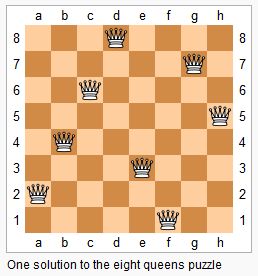2019-01-08 Daily Challenge
What I've done today is Counting Sundays in Rust and N-Queens II in JavaScript.
Math
Problem
Counting Sundays
Problem 19
You are given the following information, but you may prefer to do some research for yourself.
- 1 Jan 1900 was a Monday.
- Thirty days has September,
April, June and November.
All the rest have thirty-one,
Saving February alone,
Which has twenty-eight, rain or shine.
And on leap years, twenty-nine.
- A leap year occurs on any year evenly divisible by 4, but not on a century unless it is divisible by 400.
How many Sundays fell on the first of the month during the twentieth century (1 Jan 1901 to 31 Dec 2000)?
Solution
Simple simulation.
Implementation
fn main() {
assert!(is_leap_year(2016));
assert!(is_leap_year(1997) == false);
let days = [31, 28, 31, 30, 31, 30, 31, 31, 30, 31, 30, 31];
let mut day = 2;
let mut ans = 0;
for year in 1901..2001{
for month in 0..12 {
if day == 0 {
ans += 1;
}
if month == 1 {
day = if is_leap_year(year) { (day + 29) % 7 } else { (day + 28) % 7 };
} else {
day = (day + days[month]) % 7;
}
}
}
println!("Answer is {}", ans);
}
fn is_leap_year(n: i32) -> bool {
n % 400 == 0 || (n % 100 != 0 && n % 4 == 0)
}
Algorithm
Problem
52. N-Queens II
The n-queens puzzle is the problem of placing n queens on an n×n chessboard such that no two queens attack each other.
Given an integer n, return the number of distinct solutions to the n-queens puzzle.
Example:
Input: 4
Output: 2
Explanation: There are two distinct solutions to the 4-queens puzzle as shown below.
[
[".Q..", // Solution 1
"...Q",
"Q...",
"..Q."],
["..Q.", // Solution 2
"Q...",
"...Q",
".Q.."]
]

Solution
Simple DFS.
Implementation
/**
* @param {number} n
* @return {number}
*/
var totalNQueens = function(n) {
let row = new Array(n);
let ans = 0;
let dfs = (r) => {
if(r == n){
ans++;
return;
}
for(let i = 0 ; i < n; ++ i){
if(check(r, i)){
row[r] = i;
dfs(r + 1);
}
}
};
let check = (r, col) => {
for(let i = 0; i < r; ++i){
if(row[i] == col || Math.abs(row[i] - col) == Math.abs(r - i)){
return false;
}
}
return true;
};
dfs(0);
return ans;
};